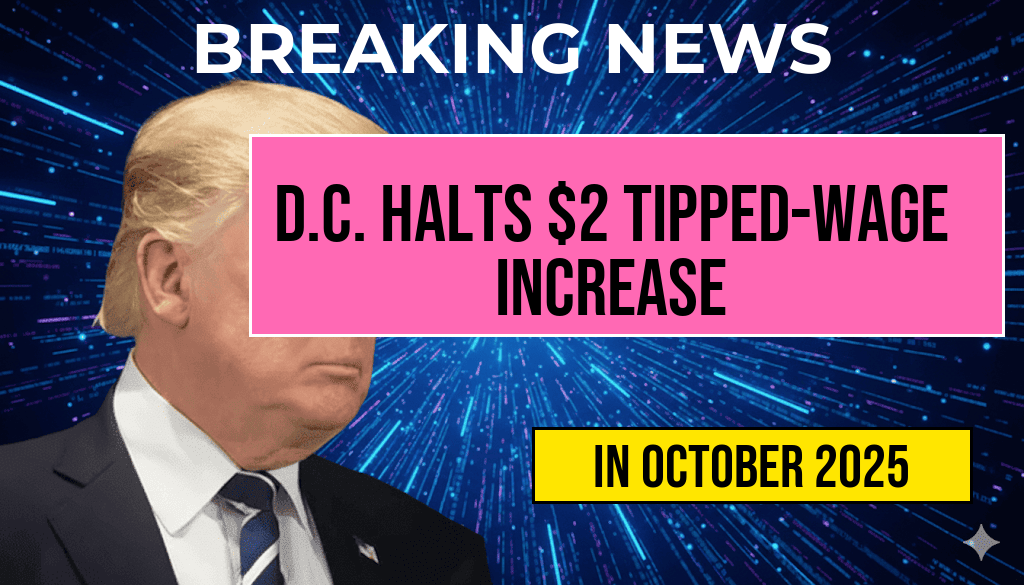Washington D.C. Reverses Tipped-Wage Increase, Potentially Reducing Servers’ Annual Earnings by Over $4,000
Washington D.C. officials announced the suspension of a planned increase in the tipped minimum wage, a move that could significantly impact restaurant workers’ income. Originally slated to rise incrementally over the next few years, the wage increase will now be halted, potentially costing tipped employees approximately $4,160 annually in earnings based on current wage estimates. The decision has sparked debate among hospitality industry stakeholders, labor advocates, and policymakers, highlighting tensions between economic recovery efforts and workers’ financial stability.
The initial plan aimed to gradually raise the tipped minimum wage from its current level of $6.00 per hour to $10.50 by 2025, aligning with broader efforts to improve living standards for service workers. However, recent city council decisions have put these plans on hold amid concerns over the economic impact on small businesses and the practicality of implementing such increases during ongoing recovery efforts following the COVID-19 pandemic. As a result, many servers and bartenders face the prospect of stagnating wages, with some estimating their annual earnings could drop by thousands compared to the original schedule.
Details of the Wage Adjustment and Its Financial Impact
The phased increase was designed to offset the reliance of many tipped workers on gratuities by gradually raising the base wage. Under the original plan, servers earning the minimum tipped wage of $6.00 would see this figure climb to $10.50 over three years. This would supplement tips and potentially boost annual earnings for full-time employees by approximately $4,160, based on average weekly hours and typical tip rates.
| Wage Level | Hourly Wage | Estimated Weekly Hours | Annual Earnings (including tips) |
|---|---|---|---|
| Original plan (2024-2025) | $10.50 | 30 | $16,380 |
| Current halted plan | $6.00 | 30 | $9,360 |
| Difference | -$7,020 annually | ||
This table underscores the stark difference in potential earnings, with servers facing a possible loss exceeding $7,000 annually when comparing the halted plan to the originally scheduled increase. Even with tips factored in, the gap remains substantial, raising concerns about the financial well-being of those dependent on tips for a significant portion of their income.
Context and Reactions from Stakeholders
The decision to halt the wage increase comes amidst a broader national debate over minimum wage policies and the economic pressures faced by the restaurant industry. Proponents of the increase argue that it is essential to ensure fair compensation and reduce income disparities among service workers, many of whom rely heavily on tips that fluctuate based on customer volume and economic conditions.
“This rollback undermines years of efforts to elevate living standards for tipped workers,” stated labor advocates. “It’s a step backward for economic justice.”
Conversely, some business groups contend that the wage hike could lead to increased operational costs, potentially resulting in reduced hours, layoffs, or increased menu prices. “Small businesses are still recovering from the pandemic’s fallout,” argued a representative from the D.C. Restaurant Association. “Implementing such increases prematurely could threaten their viability.”
Broader Implications for D.C. and Beyond
The move reflects a broader trend seen in various jurisdictions grappling with how best to balance fair wages with economic sustainability. According to economic analysts, halting scheduled wage increases may prolong financial instability for service workers, especially during periods of economic uncertainty. It also raises questions about the future of wage policies in the nation’s capital, which has historically positioned itself as a leader in progressive labor standards.
For workers, the decision underscores the importance of ongoing advocacy efforts and the need for comprehensive policy solutions that address both wage adequacy and industry resilience. As the city moves forward, stakeholders will watch closely to see if additional adjustments are made or if the halt signals a permanent shift in wage policy.
Additional Resources
Frequently Asked Questions
What is the main reason D.C. halted the $2 tipped-wage increase?
The District of Columbia paused the $2 tipped-wage increase due to concerns over economic impact on servers and the hospitality industry.
How much could servers potentially lose annually due to this change?
Servers could potentially lose up to $4,160 annually compared to the original plan because of the halt in the tip wage increase.
What was the original plan for the tipped-wage increase in D.C.?
The original plan involved a $2 increase in the tipped wage, aimed at gradually raising the minimum wage for servers and improving their income stability.
How might this decision impact servers’ earnings in D.C.?
By halting the wage increase, servers in D.C. might see a decrease in earnings and financial stability, potentially affecting their income significantly.
Are there any future plans or actions regarding tipped wages in D.C.?
There may be ongoing discussions or policy reviews about tipped wages in D.C., but currently, the $2 increase has been halted for the time being.

Leave a Reply